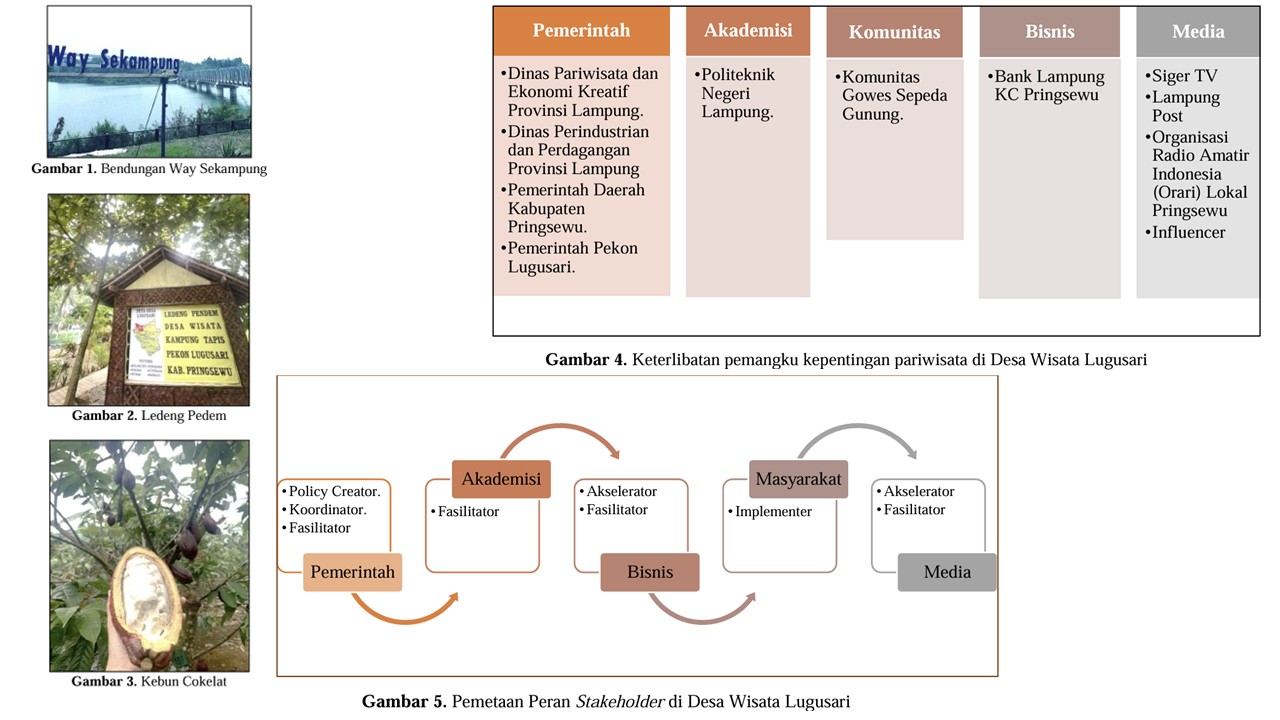Mapping the Role and Collaboration of Stakeholders in Ecotourism Management and Creative Economic Development of the Tapis Lampung Center in the Lugusari Tourist Village, Lampung Province
DOI:
https://doi.org/10.46252/jsai-fpik-unipa.2025.Vol.9.No.1.481Keywords:
Ecotourism, Lugusari Tourism Village, StakeholderAbstract
The latest tourism development is focused on the attraction of living activities and rural resources by highlighting various potential regional authenticity. As a derivative of the concept of sustainable tourism development, the development of tourism villages directly contributes to the preservation and introduction of local culture, superior agricultural and plantation activities, as well as triggering the creation of various creative ideas to support the local economy. The selection of this research location was based on research that the Governor of Lampung Province had issued a 2022 decree determining 3 tourism villages focused on developing Lampung Tapis centers, one of which was Lugusari Tourism village, Pagelaran District, Pringsewu Regency. This was welcomed very positively by various welcome who involved themselves directly in developing and promoting various potentials and attractions in the Lugusari Tourism village. Seeing the large number of contributes entering, it is important to identify each stakeholder and carry out role mapping so that the direction of effective and optimal collaboration can be seen. Data were collected by observation, interviews, and literature studies, then analyzed descriptively qualitatively. Based on the research results, it was identified that the tourism pentahelix plays an active role in the management of the Lugusari Tourism village which includes government, private, academic, media, and especially the community stakeholders. The flow of stakeholder coordination in the Lugusari Tourism village is centered on the village government which is at the lead of control regarding regulatory direction, ideas, concepts and program implementation as well as controlling the management conditions of the Lugusari Tourism village. Furthermore, the role of stakeholders in Lugusari Tourism village is divided into 5, namely policy creator (government), Regulator (government), Facilitator (government, academics, business and media), Accelerator (Business and Media), and Implementer (Community).
Downloads
References
Ansell, C., and A Gash. 2008. Collaborative governance in theory and practice. Journal of Public Administration Research and Theory, vol. 18, no. 4, pp. 543–571.
Budimanta, Arif. 2008. Corporate Social Responsibility: Alternatif bagi Pembangunan Indonesia. Jakarta: ICSD.
Elista, A., Kismartini, and A Z Rahman. 2020. Peran Stakeholder dalam Program Pencegahan Kekerasan dalam Rumah Tangga di Kota Semarang,” Journal of Public Policy and Management Review, vol. 10, no. 3, pp. 363–377.
Gupta, Joyeeta. 2015. Toward and Elaborated Theory of Inclusive Development. Europan Journal of Development Research, vol. 27, no. 4, pp. 541–559.
Nandi. 2005. Kajian Keberadaan Tempat Pembuangan Akhir (TPA) Leuwigajah dalam Kontetk TAta-Ruang. Jurnal “GEA” Jurusan Pendididkan Geografis , vol. 1, no. 9.
Nugroho, Hermawan Cahyo., Soesilo Zauhar, and Suryadi. 2014. Koordinasi Pelaksanaan Program Pengembangan Kawasan Agropolitan di Kabupaten Nganjuk. Jurnal Pembangunan dan Alam Lestari, vol. 5, no. 1.
Suharto, B. 2011. Tata Kelola Organisasi Destinasi Candi Borobudur. Jurnal Ekonomi Manajemen Sumber Daya, vol. 12, no. 1, pp. 35–49.
Sugiharto, B. 2011. Analisis pengaruh komunikasi, kepemimpinan dan pendidikan terhadap tingkat partisipasi masyarakat dalam pengembangan desa wisata. Jurnal Ilmiah Pariwisata Bina Wisata Nusantara , vol. 16, no. 1.
Waligo, V.M., J Clarke, and R Hawkins. 2013. Implementing sustainable tourism: A multi-stakeholder involvement management framework., Tour Manag, vol. 36, pp. 342–353.
Wijaya, S. S., Zulkarnain, and Sopingi. 2016. Proses Belajar Kelompok Sadar Wisata (POKDARWIS) dalam Pengembangan Kampoeng Ekowisata. Jurnal Pendidikan Nonformal, vol. 11, no. 2.
Wood, Donna J and Barbara Gay. 1991. Towards a Comprehensive Theory of Collaboration. Journal of Applied Behavorial Science., vol. 27, pp. 139–162.
Zhang, J., R J Inbakaran, and M S Jackson. 2006. Understanding community attitudes towards tourism and host-guest interaction in the urban - Rural border region, Tourism Geographies, vol. 8, no. 2, pp. 182–204

Downloads
Published
How to Cite
Issue
Section
License
Copyright (c) 2025 Meyliana Astriyantika, Enggar Dwi Cahyo

This work is licensed under a Creative Commons Attribution-ShareAlike 4.0 International License.

















